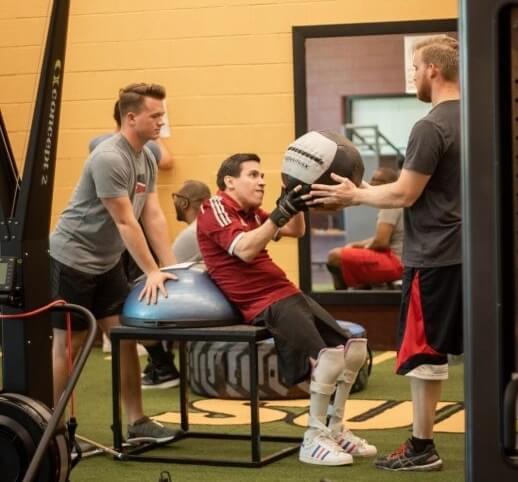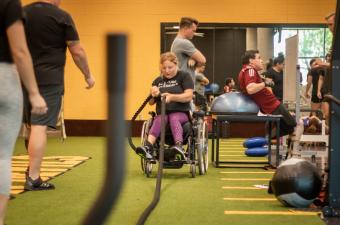Adaptive Athletes join ASU community
The SDFC welcomes its newest facility—the Adaptive Training Center (ATC), which is used as a workout space for athletes with physical disabilities.
The facility is an expansion of the Adaptive Training Foundation (ATF), a nine week program originating in Dallas, Texas.
The program is designed to empower athletes with physical challenges and help them grow both mentally and physically. It is now running at ASU every Monday, Tuesday and Thursday from 5 p.m. to 6:30 p.m.
Hunter Clark, the Director of Operations and Programs, explained, “the goal is, how do we get the same stimulus that an NFL player going through training would get, adapted to somebody with no arms and no legs or somebody in a wheelchair or whatever it may be?”
The athletes utilize the ATC’s equipment in unique ways and are guided by volunteer trainers as they work to test their limits. But as much as ATF is about physical growth, it is just as much about building a supportive community.
The athletes and trainers often describe themselves as a “tribe” because, although they are facing separate challenges, they come together to encourage one another.
Staff Member Ana Magalon described the course as a journey and said, “we’re not just there for that hour and a half when we work out, we’re there to see how the rest of your life is going. We support each other.”
But the ATF community doesn’t end with the athletes and trainers. ATF encourages everyone to be a part of it.
Clark explained, “All these people walking back and forth every day can contribute to that environment and if they’re doing it for the right reasons…then we want to utilize it.”
There are applications available at the SDFC to volunteer as a trainer, as well as applications to be an Adaptive Athlete. You are also welcome to come in and hang out every Thursday during open gym.
Whether you’re working out alongside the athletes or just coming to watch and support, you are encouraged to stop by and be a part of the experience.
“We want to be able to have our athletes stand up at graduation saying that their lives are completely different,” Clark said. “And we can’t do that without the people, without the interactions, and without the community that is this tribe.”

